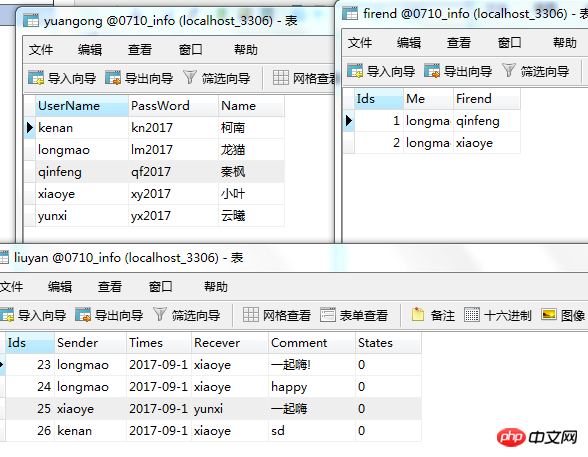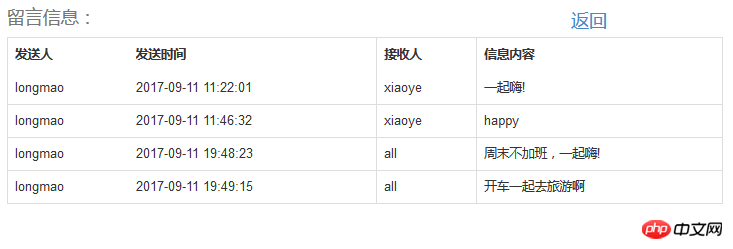 Backend Development
Backend Development
 PHP Tutorial
PHP Tutorial
 How to use PHP to connect to the database to implement the message board function
How to use PHP to connect to the database to implement the message board function
How to use PHP to connect to the database to implement the message board function
PHP implements the message board function:
1 The first is the login page:
<!DOCTYPE html>
<html>
<head>
<meta charset="UTF-8">
<title>留言板登录</title>
<script src="bootstrap/js/jquery-1.11.2.min.js"></script>
<script src="bootstrap/js/bootstrap.min.js"></script>
<link href="bootstrap/css/bootstrap.min.css" rel="stylesheet" type="text/css"/>
</head>
<style>
.header{
margin-left: 550px;
margin-top: 150px;
height: 300px;
max-width: 300px;
}
.xiugai{
max-width: 200px;
}
.login{
margin-top: 10px;
}
</style>
<body>
<form action="messloginchuli.php" method="post">
<p class="header">
<h2>开发部内部留言板</h2>
<p class="input-group xiugai">
<span class="input-group-addon" style="margin-top: 20px;">用户名:</span>
<input type="text" class="form-control" name="uid" placeholder="请输入用户名">
</p>
<p class="input-group xiugai" style="margin-top: 10px;">
<span class="input-group-addon">口令:</span>
<input type="text" class="form-control" name="pwd" placeholder="请输入口令">
</p>
<button type="submit" class="btn btn-success login">登录</button>
</p>
</form>
</body>
</html>2 After the login page is completed, you need to enter the login processing page, which is the messageloginchuli.php# submitted above. ##
<?phpsession_start();
// 登录之后要把所包含登录的页面连接起来,开启session$uid = $_POST["uid"];
$pwd = $_POST["pwd"];
require_once "./DBDA.class.php";
$db = new DBDA();
$sql = "select password from yuangong where username=' {
$uid
}
'";
$arr = $db->query($sql,0);
//var_dump($arr[0][0]);
if($arr[0][0]=$pwd && !empty($pwd)) {
$_SESSION["uid"]=$uid;
header("location:message.php");
}
?>

<!DOCTYPE html>
<html>
<head>
<meta charset="UTF-8">
<title></title>
<script src="bootstrap/js/jquery-1.11.2.min.js"></script>
<script src="bootstrap/js/bootstrap.min.js"></script>
<link href="bootstrap/css/bootstrap.min.css" rel="stylesheet" type="text/css"/>
</head>
<style>
.mess{
max-width: 800px;
margin-left: 250px;
margin-top: 150px;
}
</style>
<body>
<?php
session_start();
$uid = $_SESSION["uid"];
if(empty($_SESSION["uid"])){
header("location:messlogin.php");
exit;
}
?>
<p style="margin-left: 880px; margin-top: 50px;font-size: 20px;" >
<a href="publish_info.php" >发布信息</a>
<a href="tuichuchuli.php">退出系统</a>
</p>
<table class="table table-bordered mess" style="margin-top: -40px;">
<caption style="font-size: 20px;">
留言信息:
</caption>
<thead>
<tr>
<th>发送人</th>
<th>发送时间</th>
<th>接收人</th>
<th>信息内容</th>
</tr>
</thead>
<tbody>
<?php
require_once "./DBDA.class.php";
$db = new DBDA();
$sql = "select * from liuyan where recever='{$uid}' or recever='all'";
$arr = $db->query($sql,0);
foreach($arr as $v){
echo "<tr>
<td>{$v[1]}</td>
<td>{$v[2]}</td>
<td>{$v[3]}</td>
<td>{$v[4]}</td>
</tr>";
}
?>
</tbody>
</table>
</body>
</html>Exit the login system to implement user logout, and return to the login page. The function code is as follows:
<?phpsession_start();
$uid = $_SESSION["uid"];
unset($uid);
header("location:messlogin.php");
?>

<!DOCTYPE html><html> <head> <meta charset="UTF-8"> <title>发布信息界面</title> <script src="bootstrap/js/jquery-1.11.2.min.js"></script> <script src="bootstrap/js/bootstrap.min.js"></script> <link href="bootstrap/css/bootstrap.min.css" rel="stylesheet" type="text/css"/> </head> <style> .mess {
max-width: 200px;
margin-top: 10px;
}
.mess1 {
margin-top: 10px;
}
.opt {
max-width: 200px;
margin-left: 80px;
}
.txt {
max-width: 200px;
}
</style> <body><?phpsession_start();
$uid = $_SESSION["uid"];
if (empty($_SESSION["uid"])) {
header("location:messlogin.php");
exit ;
}
?> <p style="margin-left: 500px;
margin-top: 150px;
"> <p style="margin-left: 60px;
margin-bottom: 20px;
font-size: 20px;
" > <a href="message.php" >查看信息</a> <a href="seemess.php" style="margin-left: 80px;
" >查看发送信息</a> </p> <form class="form-horizontal" role="form" action="infochuli.php" method="post"> <p class="form-group"> <label for="firstname" class="col-sm-2 control-label mess1">接收人:</label> <p class="form-group "> <select class="form-control opt" name="recever"> <option value="all">所有人</option> <?php require_once "./DBDA.class.php";
$db = new DBDA();
//这里可以给特定的朋友发送信息的sql语句 //$sql = "select firend.firend,yuangong.name from firend,yuangong where firend.firend //= yuangong.username and firend.me = ' {
$uid
}
'";
$sname = "select * from yuangong where username not in (' {
$uid
}
')";
$arr = $db->query($sname,0);
//var_dump($arr[0][2]);
foreach($arr as $v) {
echo "<option value=' {
$v[0]
}
'> {
$v[2]
}
</option>";
}
?> </select> </p> </p> <p class="form-group"> <label for="lastname" class="col-sm-2 control-label mess1">信息内容:</label> <p class="col-sm-10"> <textarea class="form-control txt" rows="3" name="content"></textarea> </p> </p> <p class="form-group"> <p class="col-sm-offset-2 col-sm-10"> <button type="submit" class="btn btn-default"> 发送 </button> </p> </p> </form> </p> </body></html>
<?phpsession_start();
$uid = $_SESSION["uid"];
$recever = $_POST["recever"];
$content = $_POST["content"];
$arr = $_POST["recever"];
$t = date("Y-m-d H:i:s");
require_once "./DBDA.class.php";
$db = new DBDA();
$sql = "insert into liuyan values('',' {
$uid
}
',' {
$t
}
',' {
$recever
}
',' {
$content
}
',0)";
$arr = $db->query($sql);
if($arr && !empty($arr)) {
header("location:publish_info.php");
}
else {
echo "发送失败!";
}
?>The above is the detailed content of How to use PHP to connect to the database to implement the message board function. For more information, please follow other related articles on the PHP Chinese website!

Hot AI Tools

Undresser.AI Undress
AI-powered app for creating realistic nude photos

AI Clothes Remover
Online AI tool for removing clothes from photos.

Undress AI Tool
Undress images for free

Clothoff.io
AI clothes remover

Video Face Swap
Swap faces in any video effortlessly with our completely free AI face swap tool!

Hot Article

Hot Tools

Notepad++7.3.1
Easy-to-use and free code editor

SublimeText3 Chinese version
Chinese version, very easy to use

Zend Studio 13.0.1
Powerful PHP integrated development environment

Dreamweaver CS6
Visual web development tools

SublimeText3 Mac version
God-level code editing software (SublimeText3)

Hot Topics
 Explain JSON Web Tokens (JWT) and their use case in PHP APIs.
Apr 05, 2025 am 12:04 AM
Explain JSON Web Tokens (JWT) and their use case in PHP APIs.
Apr 05, 2025 am 12:04 AM
JWT is an open standard based on JSON, used to securely transmit information between parties, mainly for identity authentication and information exchange. 1. JWT consists of three parts: Header, Payload and Signature. 2. The working principle of JWT includes three steps: generating JWT, verifying JWT and parsing Payload. 3. When using JWT for authentication in PHP, JWT can be generated and verified, and user role and permission information can be included in advanced usage. 4. Common errors include signature verification failure, token expiration, and payload oversized. Debugging skills include using debugging tools and logging. 5. Performance optimization and best practices include using appropriate signature algorithms, setting validity periods reasonably,
 PHP Program to Count Vowels in a String
Feb 07, 2025 pm 12:12 PM
PHP Program to Count Vowels in a String
Feb 07, 2025 pm 12:12 PM
A string is a sequence of characters, including letters, numbers, and symbols. This tutorial will learn how to calculate the number of vowels in a given string in PHP using different methods. The vowels in English are a, e, i, o, u, and they can be uppercase or lowercase. What is a vowel? Vowels are alphabetic characters that represent a specific pronunciation. There are five vowels in English, including uppercase and lowercase: a, e, i, o, u Example 1 Input: String = "Tutorialspoint" Output: 6 explain The vowels in the string "Tutorialspoint" are u, o, i, a, o, i. There are 6 yuan in total
 How do you parse and process HTML/XML in PHP?
Feb 07, 2025 am 11:57 AM
How do you parse and process HTML/XML in PHP?
Feb 07, 2025 am 11:57 AM
This tutorial demonstrates how to efficiently process XML documents using PHP. XML (eXtensible Markup Language) is a versatile text-based markup language designed for both human readability and machine parsing. It's commonly used for data storage an
 Explain late static binding in PHP (static::).
Apr 03, 2025 am 12:04 AM
Explain late static binding in PHP (static::).
Apr 03, 2025 am 12:04 AM
Static binding (static::) implements late static binding (LSB) in PHP, allowing calling classes to be referenced in static contexts rather than defining classes. 1) The parsing process is performed at runtime, 2) Look up the call class in the inheritance relationship, 3) It may bring performance overhead.
 What are PHP magic methods (__construct, __destruct, __call, __get, __set, etc.) and provide use cases?
Apr 03, 2025 am 12:03 AM
What are PHP magic methods (__construct, __destruct, __call, __get, __set, etc.) and provide use cases?
Apr 03, 2025 am 12:03 AM
What are the magic methods of PHP? PHP's magic methods include: 1.\_\_construct, used to initialize objects; 2.\_\_destruct, used to clean up resources; 3.\_\_call, handle non-existent method calls; 4.\_\_get, implement dynamic attribute access; 5.\_\_set, implement dynamic attribute settings. These methods are automatically called in certain situations, improving code flexibility and efficiency.
 MySQL: Simple Concepts for Easy Learning
Apr 10, 2025 am 09:29 AM
MySQL: Simple Concepts for Easy Learning
Apr 10, 2025 am 09:29 AM
MySQL is an open source relational database management system. 1) Create database and tables: Use the CREATEDATABASE and CREATETABLE commands. 2) Basic operations: INSERT, UPDATE, DELETE and SELECT. 3) Advanced operations: JOIN, subquery and transaction processing. 4) Debugging skills: Check syntax, data type and permissions. 5) Optimization suggestions: Use indexes, avoid SELECT* and use transactions.
 PHP and Python: Comparing Two Popular Programming Languages
Apr 14, 2025 am 12:13 AM
PHP and Python: Comparing Two Popular Programming Languages
Apr 14, 2025 am 12:13 AM
PHP and Python each have their own advantages, and choose according to project requirements. 1.PHP is suitable for web development, especially for rapid development and maintenance of websites. 2. Python is suitable for data science, machine learning and artificial intelligence, with concise syntax and suitable for beginners.
 What is Cross-Site Request Forgery (CSRF) and how do you implement CSRF protection in PHP?
Apr 07, 2025 am 12:02 AM
What is Cross-Site Request Forgery (CSRF) and how do you implement CSRF protection in PHP?
Apr 07, 2025 am 12:02 AM
In PHP, you can effectively prevent CSRF attacks by using unpredictable tokens. Specific methods include: 1. Generate and embed CSRF tokens in the form; 2. Verify the validity of the token when processing the request.





